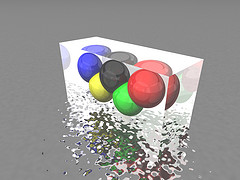1. Paco likes soccer

|
| By Ben and Rachel Apps. C. Commons |
As we have seen, when Paco wants to talk about permanent situations, habits, routines, daily activities, likes, dislikes, or even about scheduled events, he uses the Present Simple Tense. He also uses the Simple Present with verbs expressing possession, senses, emotions and mental activity.
What tense do you use in Spanish?
So, as you may imagine, the Present Simple is a very common tense in English. Our friend Paco also likes new technologies and he has a presentation of the things he usually does everyday. Have a look at it!
Paco does a lot of things every day. Do you think he has enough time to do all of them? Do you do any of the activities Paco does? Write them down!
In this video you will hear something you must remember when using the Present Simple Tense. Watch the video and guess!
Yes, you're right, the third person singular (he, she, it) takes -s (e.g. "I walk, he walks, she walks, it walks, they walk, we walk, you walk"). So we say, for example, I like football, but, Paco (he) likes soccer or Paco's sister (she) loves travelling.
Notice: Modal verbs (can, must, will, would, etc.) NEVER take the third person singular -s.
E.g.:
We can play soccer on Saturdays and Paco (he) can come with us.
They must be at home now because Sofia (she) must stay at home on Sunday mornings.
Read the sentences below and fill in the missing verbs in the present simple tense. Choose from:
play - study - do - make - like - love
- I don't studying in the morning. However, I doing my homework in the evening, when everybody is sleeping.
- Paco and his friends usually football on Saturdays and Andrés cards with his family on Sunday afternoons.
- Both of them very hard to prepare their exams at the university.
- Can you me a favour? I have to a cake and I need some ingredients. Could you go to the shop and get them for me?
- Andrés's mother always dinner for the whole family. She doing it!

|
| By Marion Cerrato. C. Commons |
Although Chinese are said to be the first who played ball games as long ago as the second or third centuries BC soccer, as we know it today, began in 1863 in England.
The Football Association, created that year, set the foundations for the way this sport is played today in its Laws of the Game. It quickly spread all over the world. The first countries that formed their football associations after England were Scotland (1873), Wales (1875) and Ireland (1880). A lot of countries followed them, the Netherlands and Denmark were the first out of Britain in 1889. The Spanish football association, known as Real Federación Española de Fútbol (RFEF), was created in 1909.
The word soccer appeared as a slang abbreviation of "association" in England in the 1880s. It is frequently used in those countries where the word football is used to refer to American football such as in the United States and Canada. In the countries where the most important football code is soccer, the game is generally known simply as football.
 |
| By Anonymous.C. Commons |
With sports and activities we usually use the verbs do, play or go. Do you know when we use them? Click here to guess and practise. However, to be able to use them, you also need to know the English words for those sports and activities. So, click here to improve them. If you want to keep fit, have a look at all the sports and activities you can do, play or go; and here you are some vocabulary related to the Olympic Games.
We have seen the main uses of the Present Simple Tense. Let's see now an important topic you should always bear in mind: the structure of positive English sentences!